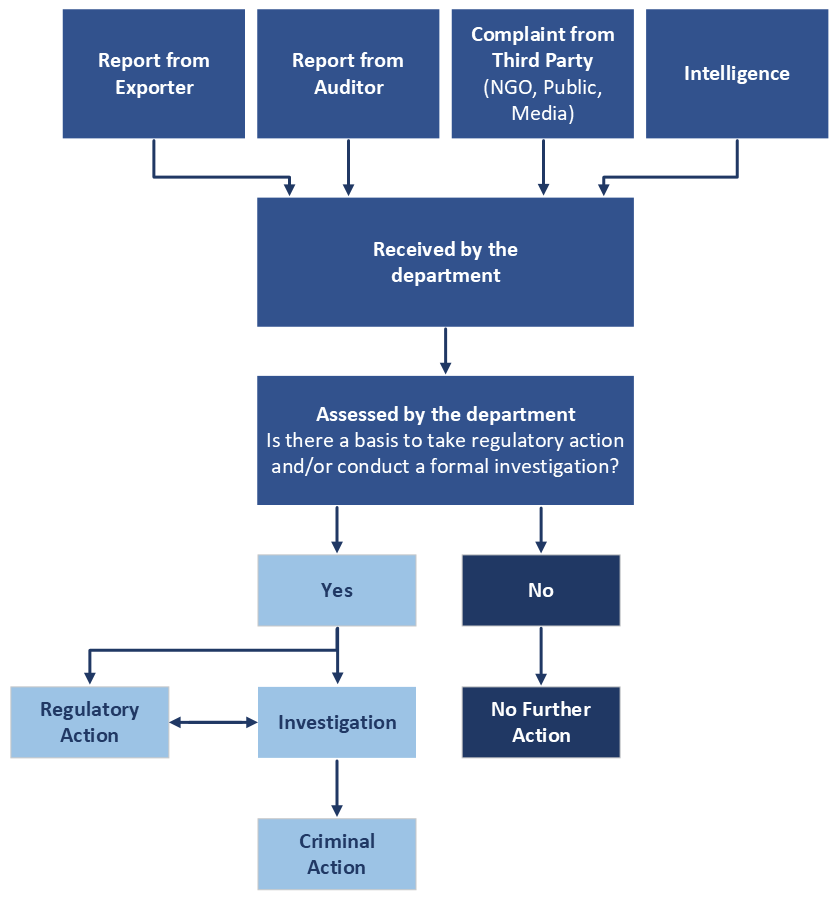We may receive information on potential non-compliance with regulations. These come from many sources, including:
- self-reporting by regulated entities
- Exporter Supply Chain Assurance System (ESCAS) independent audit reports
- department intelligence
- reports from third parties.
The core elements of our compliance strategy are to:
- improve transparency to assist stakeholders in understanding their rights and obligations
- make it as easy as possible for exporters to meet their regulatory obligations
- support stakeholders who want to do the right thing
- actively pursue those who opportunistically or deliberately contravene Australian legislation that governs the export of live animals
Read the Compliance statement for the export of livestock for more detailed information.
Download
Compliance statement of the export of livestock (PDF 1.6MB)
Compliance statement of the export of livestock (DOCX 1.5MB)
If you have difficulty accessing these files, visit web accessibility for assistance.
How we investigate
We assess all the information we receive. Then we may commence a formal investigation and take regulatory action.
Investigation process
We receive information from exporters, auditors, third parties or internal departmental intelligence. We assess this information. Then we may commence a formal investigation. This can lead to regulatory action, criminal action, or no further action.
Guideline – Management of Non-Compliance
Publication details
The purpose of this guideline is to assist departmental staff in the management of ESCAS non-compliances for the export of feeder and slaughter livestock. This document was originally published in 2012, and we are now publishing a revised version (August 2024).
Download
Guideline - Management of Non-Compliance (PDF 288 KB)
Guideline - Management of Non-Compliance (DOCX 279 KB)
If you have difficulty accessing these files, visit web accessibility for assistance.
Addressing non-compliance
We apply a range of regulatory responses to address non-compliance. We may do this prior to, during and/or at the end of an investigation.
Regulatory actions include:
- asking an exporter for more information about their export consignment
- applying extra conditions to an approval
- refusing to approve an application
- issuing an exporter with a formal direction
- action against a regulated entity
- referring a matter to the Director of Public Prosecutions. Possible criminal sanctions include fines or imprisonment.
Current and past investigations
We publish information about the following investigations on our website.
Our ESCAS investigation reports include exporter self-reports and third party reports of non-compliance with ESCAS.
Our investigations into notifiable mortality incidents determine the cause of the incident (where possible) and inform regulatory actions taken to address the issues.
Our intent through undertaking these investigations and publishing reports is to:
- improve transparency of the live export trade
- determine, where possible, the causes of the incidents
- determine if action is needed to reduce the risk of reoccurrence.
How to lodge a complaint
Send your report of possible non-compliance in writing by:
Attention:
Director, Regulatory Performance and Compliance section
Live Animal Export branch
Department of Agriculture, Fisheries and Forestry
GPO Box 858
Canberra ACT 2601

